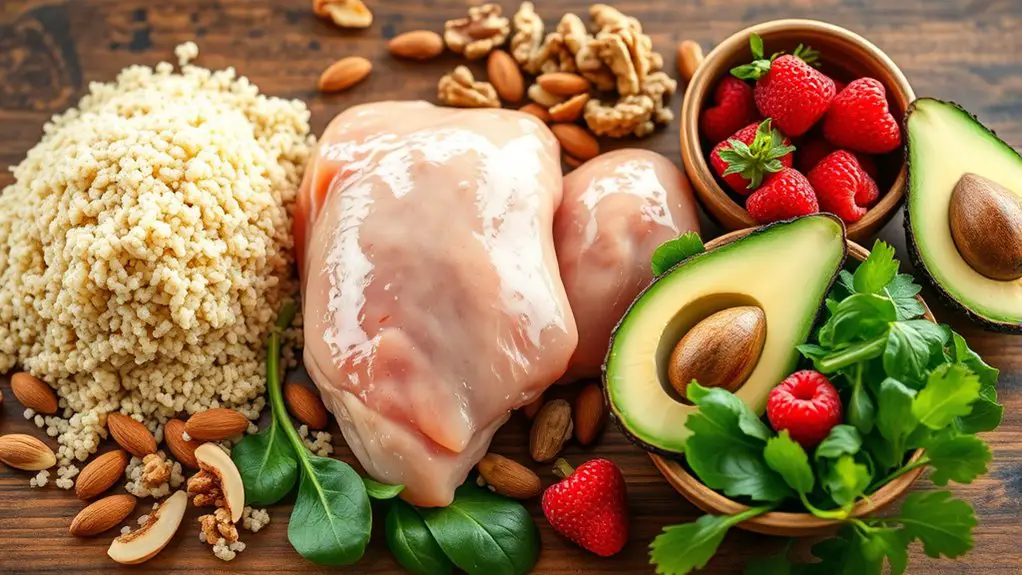As an athlete, your protein needs vary based on factors like age, training intensity, and body composition. Generally, endurance athletes should aim for 1.2 to 1.4 grams of protein per kilogram of body weight, while strength athletes need 1.6 to 2.2 grams. Timing is essential; spread your intake throughout the day and consume protein post-workout to optimize recovery. With these guidelines in mind, you can guarantee you’re fueling your performance effectively. Learn more about maximizing your protein intake.
Understanding Protein and Its Role in Athletic Performance
Protein is often hailed as the cornerstone of athletic performance, playing an essential role in muscle repair and growth. When you push your limits, your muscles face stress and micro-tears. That’s where protein comes in, fueling protein synthesis, which helps rebuild those muscles stronger than before. For anyone chasing freedom in their physical pursuits, understanding how protein supports muscle recovery is crucial. It’s not just about what you eat; timing matters too. Consuming protein shortly after workouts can optimize recovery, allowing you to seize each day with renewed energy. Additionally, adequate protein intake reduces soreness and accelerates recovery time, enabling athletes to perform at their best. Embrace the power of protein to elevate your performance and reclaim your freedom on the field, track, or wherever your passions lie. Keep fueling your body right, and watch your potential soar!
Factors Influencing Protein Requirements
While many athletes focus on the quantity of protein they consume, several factors actually dictate individual protein needs. Age factors play a role, as younger athletes may require more for growth and development. Your training intensity influences how much protein’s needed to support muscle repair and growth. Body composition also matters; leaner athletes often need more protein to maintain muscle mass. Don’t forget recovery needs—after intense workouts, your body craves protein for ideal healing. Metabolic rate varies from person to person, affecting overall requirements. Gender differences can’t be overlooked, as men generally have higher protein needs than women. Finally, the sport type you engage in will determine how much protein you should aim for to enhance performance.
Recommended Protein Intake for Endurance Athletes
As an endurance athlete, knowing your daily protein requirements is essential for peak performance. You’ll also want to pay attention to when and how you distribute your protein intake throughout the day. Let’s explore the best protein sources to help you meet these needs effectively.
Daily Protein Requirements
Endurance athletes typically require between 1.2 to 1.4 grams of protein per kilogram of body weight each day to support their training and recovery needs. It’s essential to ditch common protein myths that could undermine your performance. Here’s what you should consider when determining your daily protein requirements:
- Body Weight: Calculate your protein needs based on your current weight.
- Training Intensity: More intense training may demand higher protein intake.
- Overall Diet: Balance your protein with carbs and fats for ideal energy.
- Recovery Needs: Adjust protein intake during heavier training periods for better recovery.
Timing and Distribution
To maximize your performance and recovery, it is crucial to pay attention to when and how you distribute your protein intake throughout the day. For endurance athletes, incorporating pre workout protein can help fuel your workouts and improve endurance. Aim for a protein-rich snack about 30 minutes before you hit the road or trail. After your session, focus on post workout recovery by consuming protein within 30 minutes to help repair and rebuild muscle. Spread your protein intake evenly across meals and snacks throughout the day, targeting around 20-25 grams per serving. This approach not only supports muscle synthesis but also keeps your energy levels stable, giving you the freedom to push your limits and enjoy your training.
Protein Sources Recommended
When it comes to fueling your body for peak performance, choosing the right protein sources is essential. You’ve got options, and whether you lean towards plant-based or animal-based proteins, it’s all about what makes you feel your best. Here are some recommended sources:
- Chicken or Turkey – Lean and packed with essential amino acids.
- Quinoa – A complete plant-based protein that’s versatile and easy to digest.
- Greek Yogurt – Creamy and rich in protein, great for recovery.
- Lentils – High in protein and fiber, perfect for plant lovers.
Mixing these sources can help you meet your protein needs while enjoying the freedom of diverse flavors. Choose what resonates with you and fuel your journey!
Recommended Protein Intake for Strength Athletes
As a strength athlete, you need to evaluate how much protein you should be consuming to support your training. The ideal amount, timing of intake, and various sources of protein all play vital roles in maximizing your performance and recovery. Let’s break down these key factors to help you meet your protein needs effectively. Additionally, incorporating whey protein supplements post-workout can significantly enhance muscle repair and growth.
Optimal Protein Amount
For strength athletes, the ideal protein intake typically ranges from 1.6 to 2.2 grams of protein per kilogram of body weight each day. This amount can greatly enhance your muscle recovery and overall performance. Here’s how to determine your needs:
- Calculate your weight: Weigh yourself in kilograms.
- Choose your target: Decide if you’re aiming for the lower or upper range based on your training intensity.
- Multiply: Multiply your weight by your chosen protein amount to find your daily intake.
- Adjust as needed: Monitor your recovery and adjust intake based on how your body responds.
Timing of Intake
Timing your protein intake can greatly impact your muscle recovery and growth. To maximize your gains, focus on consuming pre workout protein and ensuring adequate post workout recovery. Here’s a simple guide to help you plan:
| Timing | Suggested Intake |
|---|---|
| Pre-Workout | 20-30g protein 30-60 mins prior |
| Post-Workout | 20-40g protein within 30 mins |
| Between Meals | 10-20g protein every 3-4 hours |
| Before Bed | 20-30g slow-digesting protein |
| Total Daily Intake | 1.6-2.2g/kg of body weight |
Sources of Protein
When it comes to fueling your body for strength training, choosing the right sources of protein is essential. You’ve got options, and both plant-based and animal-based proteins can power your workouts. Here are some great sources to take into account:
- Animal-Based Proteins: Chicken, beef, and fish are packed with essential amino acids, perfect for muscle repair.
- Dairy: Greek yogurt and cottage cheese offer high protein content and are great post-workout snacks.
- Plant-Based Proteins: Lentils, chickpeas, and quinoa provide fiber and protein, making them excellent choices for muscle growth.
- Protein Powders: Whey or plant-based protein powders can be convenient options for quick shakes.
Mixing these sources will keep your meals exciting and help you meet your protein needs effectively!
The Importance of Timing and Distribution
Though many athletes focus on the total amount of protein they consume, the timing and distribution of that intake can significantly impact performance and recovery. To maximize your gains, consider how often you eat throughout the day. Meal frequency plays an essential role; spreading your protein intake across several meals helps maintain a steady supply of amino acids for muscle repair and growth. Also, pay attention to nutrient timing. Consuming protein shortly after workouts can enhance recovery and muscle synthesis. Aim for a balanced approach, ensuring you’re not just meeting protein goals but also optimizing when and how you consume it. By focusing on timing and distribution, you’ll set yourself up for greater success in your athletic endeavors. Additionally, meal timing can greatly affect energy levels and recovery, further emphasizing the importance of how you structure your protein intake throughout the day.
Sources of High-Quality Protein
After considering the timing and distribution of protein intake, it’s important to focus on the sources of high-quality protein that can help you meet your needs. Here are some great options:
Focusing on high-quality protein sources is essential for meeting your nutritional needs effectively.
- Animal-Based Proteins: Sources like chicken, fish, and eggs offer complete proteins with high protein digestibility.
- Plant-Based Proteins: Beans, lentils, and quinoa are fantastic, especially when protein combining is practiced to guarantee you get all essential amino acids.
- Protein Alternatives: Tofu and tempeh are excellent choices for a varied diet, providing high protein quality.
- Protein-Rich Snacks: Consider nuts, Greek yogurt, or protein bars to fuel your workout and recovery.
Protein Supplements: Do You Need Them?
Are you wondering if protein supplements are necessary for your athletic performance? The answer depends on your individual needs and dietary habits. While whole food sources often provide adequate protein types for most athletes, supplements can be convenient for those who struggle to meet their goals. If you find it challenging to consume enough protein through meals, a supplement might be beneficial. However, always prioritize supplement safety; choose reputable brands that undergo third-party testing. Remember, supplements shouldn’t replace whole foods but can complement your diet. Ultimately, listen to your body and assess your performance to determine if these products are right for you. Freedom in your nutrition choices means finding what works best for your unique athletic journey.
Signs of Protein Deficiency in Athletes
Recognizing the signs of protein deficiency is essential for athletes who want to maintain peak performance. If you’re feeling off, check for these key indicators:
- Muscle soreness: If your muscles ache longer than usual after workouts, it could signal inadequate protein intake.
- Fatigue signs: Persistent tiredness, even after a good night’s sleep, may indicate your body’s not getting enough fuel to recover.
- Recovery issues: Slower recovery times between workouts can suggest your body lacks the protein needed to repair and rebuild.
- Immune function: Frequent illnesses or infections might mean your immune system is weakened due to insufficient protein. Additionally, incorporating potassium-rich foods into your diet can support muscle function and help mitigate some of these issues.
Stay aware of these signs, and you’ll be better equipped to keep your performance soaring.
Practical Tips for Meeting Your Protein Needs
How can you make certain you’re getting enough protein to support your athletic goals? Start with meal planning. Take some time each week to map out your meals, ensuring you include a good source of protein at every sitting. Think about easy protein recipes like stir-fries or smoothies that can help you reach your targets without feeling restricted. You don’t need to stick to traditional options; explore plant-based proteins or lean meats to keep it exciting. Snacks matter too—grab some nuts, yogurt, or protein bars to keep your energy up throughout the day. By integrating these tips into your routine, you’ll find it easier to meet your protein needs while enjoying a diverse and fulfilling diet. Additionally, including lean meats in your meals can significantly enhance your protein intake and support muscle repair and growth.
Frequently Asked Questions
Can Too Much Protein Be Harmful for Athletes?
Yes, too much protein can be harmful for athletes. It can lead to protein toxicity, which may strain your kidneys over time, especially if you have pre-existing conditions. While you might think you’re fueling your body, excessive protein can disrupt your overall balance, affecting energy levels and hydration. It’s essential to find a healthy range that supports performance without overloading your system. Remember, moderation is key for ideal health and freedom in your training.
How Does Age Affect Protein Needs for Athletes?
As you journey through the years, you’ll find that age-related factors play a vital role in your protein needs. Younger athletes often experience more efficient protein synthesis, allowing them to recover faster. However, as you age, your body may require more protein to maintain muscle mass and support recovery. It’s important to adapt your intake to guarantee you’re fueling your freedom to perform at your best, no matter your age.
Do Protein Needs Differ for Male and Female Athletes?
Yes, protein needs can differ for male and female athletes due to gender differences in body composition and hormonal factors. Generally, men may require more protein to support muscle mass and recovery, while women might have slightly lower needs. However, individual nutritional requirements can vary based on activity level, age, and overall goals. It’s important to personalize your protein intake to make sure you’re fueling your body effectively, regardless of gender.
What Are the Best Vegetarian Protein Sources for Athletes?
For fabulous fuel, focus on fantastic vegetarian protein sources! Quinoa benefits include being a complete protein packed with essential amino acids, making it a perfect pick for athletes. Lentil recipes, like hearty soups or salads, offer a delicious way to boost your protein intake. Don’t forget about chickpeas and edamame, too! Embrace these options, and you’ll enjoy nutritious meals while fueling your freedom to perform at your best.
How Can Athletes Assess Their Protein Intake Effectively?
To assess your protein intake effectively, start by using protein tracking apps or food journals. These tools help you monitor your daily consumption and identify gaps. Incorporate intake strategies like meal prepping or adding protein-rich snacks to your routine. Don’t forget to listen to your body’s signals; it knows what it needs. Finding a balance that works for you will give you the freedom to enjoy your meals while meeting your protein goals.




